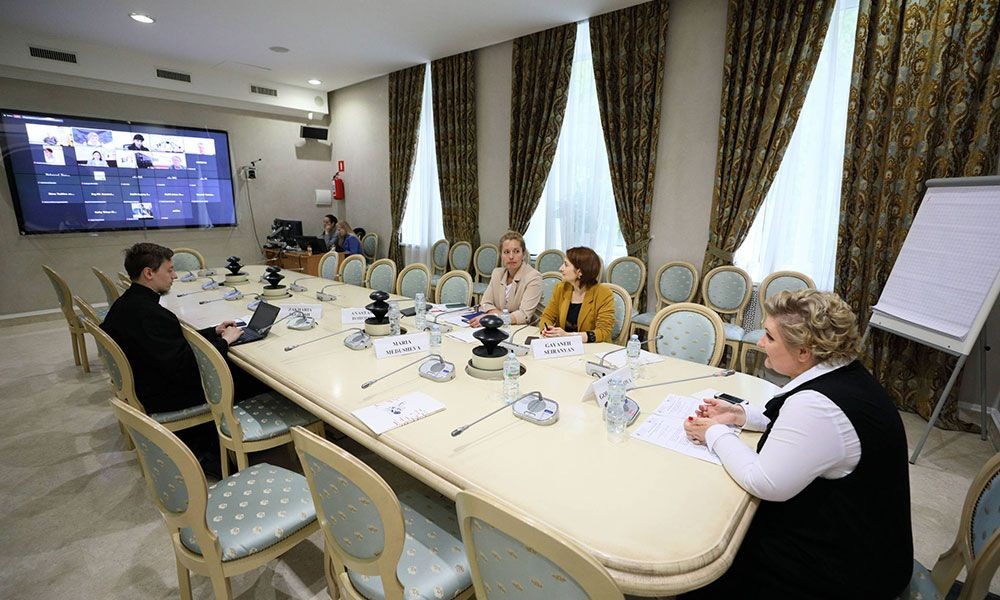Joining forces to overcome digital inequality

The Civic Chamber of the Russian Federation held a discussion session of AICESIS member countries.
On May 25, a roundtable on “Digital Inequality as a Factor Hindering the Development of Society” was held at the Civic Chamber of the Russian Federation as part of the preparation for the final report on the current Civic Chamber’s Presidency in the International Association of Economic and Social Councils and Similar Institutions (AICESIS).
The participants of the meeting gathered to discuss the problems of providing people with access to Internet services and Internet communication in different countries. For most of them, the relevant issues are still: the population’s digital literacy and digital hygiene, the impact of the COVID-19 pandemic on the transition of business and public services to the online space and problems providing ways to access and obtain services through the Internet.
The meeting was opened by Olga Golyshenkova, Deputy Chair of the Commission of the Civic Chamber of the Russian Federation on Economy and Corporate Social Responsibility Development. She thanked the representatives of the AICESIS member countries for their willingness to work together.
“A large part of the world’s population is still cut off from the benefits of digital technologies. Our task is to join forces and share experiences and specific practices to help solve these problems. AICESIS can and should serve to build understanding and integration around the world, and to understand how we can be useful to each other. I would like all participants of AICESIS to realize that on this platform we work for the good of all humankind and all countries,” she said.
Elena Vartanova, Dean of the Faculty of Journalism at Lomonosov Moscow State University, said that there are several levels of digital inequality that can be overcome by, among other things, developing digital skills and competencies. Only through digital education will society be able to move to a level where it can benefit from the use of telecommunication technologies. She said that the highest level of competence in this sphere is users’ understanding of how algorithms and algorithmic systems work on the Internet.
Anna Gladkova, a Leading Researcher of the Faculty of Journalism at Lomonosov Moscow State University and head of the International Association for Media and Communication Research (IAMCR Digital Divide Working Group), presented a model of a regional digital passport that would help to address digital inequality.
“The digital passport should understand and incorporate the digital saturation and literacy of the region, the readiness and availability of the legal structure, as well as national and demographic data. The passport will help measure and adjust the digital culture of the region, and find vulnerabilities and points of growth,” she explained.
Alexey Maltsev, Vice President for Integrated Project Management of Rostelecom, spoke about the technological component of digital inequality and Rostelecom’s experience of cooperation with the state to equip small communities of 100 to 500 residents with fiber-optic communications. He said that the program started in 2014, was completed in 2021, but based on its results, the company decided to continue the project because it had become clear during the work that these communities had serious problems with access to mobile communications.
Raul Henriquez, Director and Secretary General of the Economic and Social Council of Curaçao, described how digital inequality is being addressed in Latin America, where the gap in access to services between urban and rural areas is very large. To solve this problem, Curaçao has initiated the Digital Transformation project. So far, a network of public Internet access points has been established in rural areas.
Raul Henriquez emphasized that it is especially important for Latin American nations to provide Internet access to students in the region because it has a major impact on the quality of education.
“Access to the Internet is as important as access to water, to electricity, to gas. This was especially evident during the pandemic,” stressed Raul Henriquez.
The representative of Algeria, Mohammed Chakib Skander, raised the topic of forming a Web 3.0 environment, which should give equal rights to all participants and thus launch the process of decentralizing digital wealth. However, participation in this environment requires new competencies from consumers, which again raises the question of digital education. Algeria’s specialists are closely following Russia’s activity in the field of digital development, using it as a guide and following best practices, the speaker said.
“It seems to me that Russia should be interested in developing and participating in Web 3.0 and becoming a leader in this space,” concluded Mohammed Chakib Skander.
Mohammed Ghanashi, a representative of an Algerian telecommunications company, spoke about the experience of creating high-speed Internet networks in Algeria. “We have opened a single service that connects all the telecommunications companies because we care about consumer convenience. This is one of the elements of technological justice,” he noted.
Concluding the discussion, Apostolos Xyrafis, General Secretary of the Association, noted that the issues raised affect the entire population of the planet, and their solution requires more resources, competence, and investment. He hoped that common sense in addressing digital inequality would prevail and would allow countries to coordinate their efforts.




